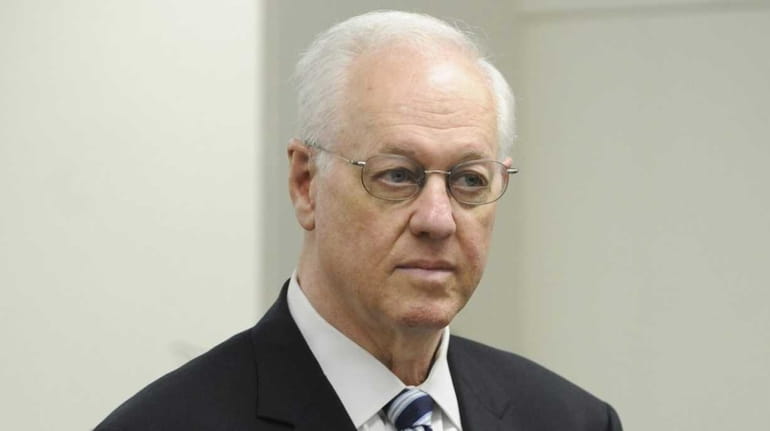At least 13 former state officials convicted of corruption eligible for pensions

Former New York State Comptroller Alan Hevesi, seen in criminal court in Manhattan on Oct. 7, 2010, is one of at least 13 former state officials convicted of corruption who are eligible to collect thousands of dollars in public pensions. Hevesi is eligible for a pension benefit now worth $126,132 a year. Credit: AP / Louis Lanzano
At least 13 former state elected officials who were convicted of corruption and other charges are eligible to collect state pension checks totaling more than $604,000 a year.
Eleven of the former lawmakers and officials driven from office by criminal convictions have been eligible to collect state pensions even while in prison, according to records from the state comptroller's office and the state and federal prison systems. Two others are awaiting sentencing.
The recipients include former Sen. Carl Kruger (D-Brooklyn), convicted in a $1 million bribery scheme in December 2011. He was sentenced to 7 years at the Fort Dix low-security federal prison in New Jersey the same year he retired to become eligible for an annual pension now worth $58,008.
Assemb. William Scarborough (D-Queens) was sentenced in May to a year in prison for wire fraud and theft over his travel vouchers. He retired two weeks later, making him eligible for a $29,256 annual pension.
And former State Comptroller Alan Hevesi, who was once in charge of managing the $183.5 billion pension system, served 20 months in a pay-to-play scandal and is eligible for a pension benefit now worth $126,132 a year, according to state and federal records.
The state comptroller's office records obtained by Newsday show a hidden, long-term cost of Albany corruption through pensions guaranteed under the state constitution. A measure to deny pensions to all elected officials convicted of felonies has been debated in Albany, but the state legislature has failed to reach an agreement.
Privacy laws prohibit the comptroller's office from confirming retirees actually are collecting benefits; it can only confirm they are eligible to do so.
"It's disgraceful," said Assembly Minority Leader Brian Kolb (R-Canandaigua). "There are individuals sitting in prison who abused their public office, but are still allowed collect retirement checks paid for by the very people they betrayed. It belies all logic and common sense, and it's insulting to every hard-working taxpayer in this state."
Pensions not calculated
Two more veteran legislators -- Sen. John Sampson (D-Brooklyn) and Assemb. William Boyland Jr. (D-Brooklyn) -- also are facing prison time after being convicted of corruption charges.
Sampson, once a top leader of the Senate, was convicted last month of trying to cover up an embezzlement and lying to the FBI. He faces up to 20 years in prison when sentenced, but he hasn't yet reached retirement age, so his pension hasn't been calculated. Boyland was convicted of bribery and extortion and sentenced to prison, but he also hasn't reached retirement age.
Former Senate Deputy Majority Leader Thomas Libous (R-Binghamton) was convicted July 22 of lying to federal agents investigating his son's job at a law firm. Libous qualifies for a $57,744 annual pension. He is awaiting sentencing.
Another former legislator awaiting sentencing, former Sen. Malcolm Smith (D-Queens), was convicted in February and faces up to 7 years for a 2013 conviction on bribery and extortion charges. A month before, he filed for retirement and qualifies for a $24,840 annual state pension.
Two of the legislature's highest-profile members who will be eligible for large pensions -- former Senate Majority Leader Dean Skelos (R-Rockville Centre) and former Assembly Speaker Sheldon Silver (D-Manhattan) -- have been indicted on federal corruption charges. If convicted, they would lose their seats and be eligible for what would likely be six-figure pensions. They face trials this fall.
In 2011, the legislature agreed that pensions should be forfeited if a lawmaker is convicted of a felony, but the law only applies to legislators elected after 2011.
That led to efforts last year by newly elected legislators to try to amend the constitution to extend the measure to all senators and Assembly members at a time when indictments were mostly against the most senior and powerful lawmakers. They failed.
Another attempt died in June even after a tentative agreement was reached in March in closed-door negotiations between Gov. Andrew M. Cuomo, the Senate's Republican majority leader and the Assembly's Democratic speaker. That bill would have eliminated pensions for all state employees convicted of felonies, while allowing judges flexibility to protect innocent spouses from losing benefits.
"We've made it very clear," Assembly Speaker Carl Heastie (D-Bronx) told reporters in the spring, "we will not leave in June without passing something with pension forfeiture."
But before the measure gained a final vote in the Assembly, public worker unions objected to the inclusion of all workers, including their members. As a result, the Assembly narrowed the measure to include only elected officials and high-level policymakers, most of whom are in the executive branch.
Senate, Assembly differ
The Senate, however, stuck with the original version. Neither house so far is warming to the other's measure. "We are committed to passing a constitutional amendment consistent with the bill we already passed," said Michael Whyland, spokesman for the Assembly's Democratic majority.
"We have already passed a pension forfeiture measure that was the result of a three-way agreement between the governor, Senate and Assembly," said Scott Reif, spokesman for the Senate's Republican majority. "The Assembly should act on it as soon as possible."
Legislative agreement on denying pensions is needed to begin the process that would lead to a public referendum on amending the constitution to do so, which would be 2018 at the earliest.
Several legislators, however, are not giving up on a constitutional amendment to end pensions for convicted lawmakers. "We are going to keep fighting and we are dedicated to making sure this becomes law," said Assemb. Charles Lavine (D-Glen Cove).
He is pushing for a Senate-Assembly conference committee to publicly agree on a single bill. Conference committees, however, are rarely used in Albany where most major issues and spending are negotiated in closed-door negotiations among the governor, Senate majority leader and Assembly speaker.
"I have great confidence that if we get together, we can come from the table with a piece of legislation," Lavine said.
Many other states have found a way. The National Conference of State Legislatures said 22 states have laws regarding forfeiture of state pensions when officials are convicted of certain crimes, although there are various exceptions.
In the absence of action in Albany, U.S. Attorney Preet Bharara, who prosecuted most recent cases, has said he will try to address the "galling injustice" by urging judges to levy fines in sentencing of his cases that claw back pensions.
Checks for convicts
Former state officials with criminal convictions and the annual state pensions for which they are eligible include:
Comptroller Alan Hevesi of Queens: $126,132
Assemb. Gloria Davis (D-Bronx): $63,283
Sen. Nicholas Spano (R-Yonkers): $70,332
Sen. Vincent Leibell (R-Putnam): $61,728
Sen. Carl Kruger (D-Brooklyn): $58,008
Sen. Thomas Libous (R-Binghamton): $57,744
Assemb. Clarence Norman Jr. (D-Brooklyn): $44,172
Sen. Efrain Gonzalez Jr. (D-Bronx): $37,099
Assemb. William Scarborough (D-Queens): $29,256
Sen. Malcolm Smith (D-Queens): $24,240
Assemb. Brian McLaughlin (D-Queens): $14,364
Assemb. Diane Gordon (D-Brooklyn): $10,644
Sen. Shirley Huntley (D-Queens): $7,428
Sources: New York State comptroller's office, state and federal prison records

